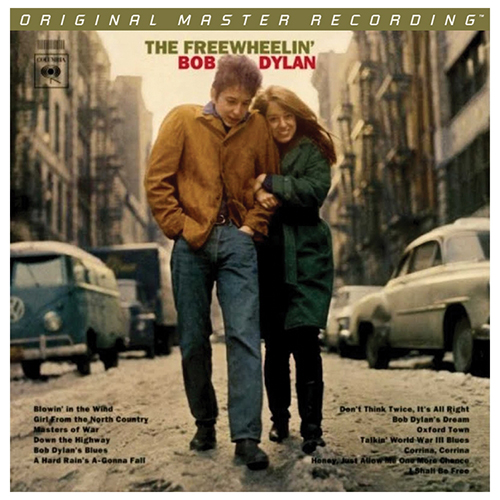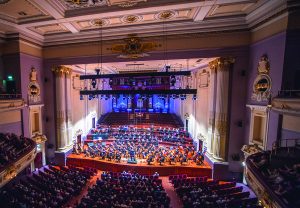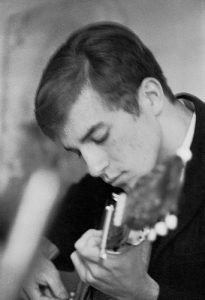
Music plays a grand role in my life. My first memory involves me discordantly playing harmonica to a blues player on a 78-rpm record. I must have been three.
My mother often played the piano while I drifted into sleep. I could hear her playing the same Chopin Preludes, haltingly, but with enjoyment, on the old upright in the hallway.
My father designed custom audio systems at the beginning of what was then called “hi-fi.” The amplifiers were large creatures with vacuum tubes, pre-transistor. My parents would invite people over to hear performances of the Boston Symphony broadcast live from Symphony Hall.
 We attended Thursday evening rehearsals at Symphony Hall, my sister and I racing to the second balcony to capture seats that hung right over the orchestra.
We attended Thursday evening rehearsals at Symphony Hall, my sister and I racing to the second balcony to capture seats that hung right over the orchestra.
As an adolescent, I joined my peers in the adulation of rock and roll and doo-wop. We were so lucky. We watched the form develop from its mid-50s beginnings. Fats Domino, Carl Perkins, the Platters, we know them all, don’t we? Intimately. We fell in love to those songs. We nursed broken hearts with those songs.
In college, the Euro-traditional melodies, instruments, and structures of classical music helped calm me in the middle of internal and circumstantial chaos. Later, I played jazz, blues, and pop music for a living. I don’t know how many times I played “Don’t Think Twice,” but I know I played it as a folk song, a rock song, and a samba.
 As a teenager, I had picked up the guitar and began learning how to play traditional folk and bluegrass tunes, learned religiously from the originals collected by John and Alan Lomax and the obscure and mysterious Harry Smith. I learned the songs faithfully represented from the Weavers, Josh White, Woody Guthrie, Cisco Houston, and Burl Ives.
As a teenager, I had picked up the guitar and began learning how to play traditional folk and bluegrass tunes, learned religiously from the originals collected by John and Alan Lomax and the obscure and mysterious Harry Smith. I learned the songs faithfully represented from the Weavers, Josh White, Woody Guthrie, Cisco Houston, and Burl Ives.
I fell in love with Joan Baez. She performed right down the road from me, and I sat at her feet, too young to drink, but full of romance. As the folk scene expanded, I learned from Odetta, Leadbelly, Dave Van Ronk, religiously reproducing their songs as best I could with my growing musical chops and young voice.
Then, one winter’s day, one of my folk buddies — a guy from Northampton with whom I performed, a guy I had met at a Quaker peace camp, where a bunch of folkies sat on the bunks in the barn dormitory, playing folk and blues tunes — showed up at my place with his big honking 12-string and taught me a tune he had just heard called “Don’t Think Twice, It’s All Right.”
The chords sounded strange and beautiful, their sequences departing from the traditional I-IV-V (with a possible minor VI thrown in) harmonic choices that so many traditional folk songs were built around. The words also lacked the formality of traditional folk music but smacked of a bluesy slang that scanned smoothly, without sounding forced or pretentious. “Ain’t no use to sit and wonder why, babe…”
Although the lyrics and the feel of the song felt like bluegrass or folk in one sense…
When the rooster crows at the break a dawn,
Look out your window, and I’ll be gone.
… it also sounded deliciously urban, urbane and outrageously hip!
The song was part Woody Guthrie on the road, part broken-hearted Buddy Holly rock and roll, part talking blues, part pure beat poetry, all accompanied by precise fingerpicking and a wailing harmonica. Screw the overcooked verbiage of Jack Kerouac, this guy said it all in so few lines.
And it ain’t no use in turning on your light, babe
I’m on the dark side of the road.
Come on! One part hobo, one part Baudelaire. I was only maybe 17, but I sure as hell knew what he was talking about. The last chorus rounded it all out.
I ain’t sayin’ you treated me unkind
You could have done better but I don’t mind
You just kinda wasted my precious time
But don’t think twice, it’s all right.
The character was so sincerely heartbroken and so carelessly cool, he had to be who I wanted to be. Later, I heard the songwriter talk about “Don’t Think Twice.”
“It’s a statement that maybe you can say something to make yourself feel better,” he said. “It’s as if you were talking to yourself.”
My friend told me about the singer-songwriter, this guy Bobby Dylan, who called himself a folksinger, but who wrote his own songs and had named himself partly after Dylan Thomas, who was, of course, a poet, not a musician.
Nobody else was writing his own folk lyrics back in 1961, at least not as mind-bendingly complex, poetic, and hard-edged as Dylan’s. Woody had come first, back in the 1940s, and Dylan worshipped Woody, but Dylan was on his own mission.
A few months after I first heard “Don’t Think Twice”, the album, “The Freewheelin’ Bob Dylan” came out. On the same record appeared “Blowin’ in the Wind,” “Masters of War,” “A Hard Rain’s Gonna Fall,” “Oxford [Mississippi] Town,” and a handful more of the most powerful political, surreal, down home, folky, unorthodox tunes I had ever heard.
The collective mind had been blown. With “Freewheelin’” and “Don’t Think Twice,” Bobby Dylan had turned the world upside down while the world had rocketed into resistance, rebellion, and love. Everything had changed.
Postscript: “The Freewheelin’Bob Dylan” proved the grist for one of the first — and last — conversations my father and I had about politics and art. He died soon thereafter, but he would have loved Dylan’s continued musical output and the times that were changing.
# # #
Writer, editor, and educator based in Los Angeles. He's also played a lot of music. Degelman teaches writing at California State University, Los Angeles.
Degelman lives in the hills of Hollywood with his companion on the road of life, four cats, assorted dogs, and a coterie of communard brothers and sisters.



Thanx Charles for taking us on more of your life’s musical journey.
I think your dad would’ve loved to know the poet Bob Dylan as the 2016 Nobel Prize laureate too. I’m still delighting over that!
He does carry on, B. Dylan. He’s had some flat spots in my humble opinion, but his latest, “Rough and Rowdy Ways” is right up there.
Mind-blowing songsters indeed, Charles. Where would we be without Bob Dylan? I loved the early Joan Baez of the 60s, who sang like an angel. A few years ago I attended a concert at Stanford for a fundraiser, and toward the end they announced a surprise guest. Who should walk out but Joan? Her hair is silver (like most of the rest of us), and she was terrific. What can I say?
Growing up outside of Boston, it was an easy journey to places like Club 47 and the Golden Vanity, where Baez played regularly. I learned so much off her early recordings. They came out of a rare and rich time.
Love this story, Charlie! I’m imagining you hearing this song for the first time from your buddy, before you knew of Bob Dylan. What a profound experience that must have been!
Listening to the clip you provided brought back so many memories of my own! Of course I was singing along, and remembered all the words easily. I used to sing my heart out with this song. “You just kinda wasted my precious time” applied to too many guys. Dylan writes such amazing lyrics. Then I went and listened to covers by Joan Baez, PP&M, and James Taylor. All different, all wonderful. Thank you for this incredible trip back through time!
Thanks, Suzy! Hearing a Dylan song for the first time ever was an unmistakable moment of inflection. Something very different happened to my ears. Then I heard him play and sing those words. Just kinda wasted my precious time, indeed! It’s a wonderful song to play and sing as are so many others.
Don’t think twice was the song I learned to finger pick on guitar—know all the words by heart. Loved the review of all those great songs and singers. You were lucky to grow up with so much music in your family, and it has clearly continued throughout your life. May it continue.
Thanks, Khati. It is a good tune for finger picking. Thinking of sitting back down with the guitar after so many years of bass playing.
Don’t Think Twice is one of those songs that both soothes and tortures me. I am personally partial to Peter, Paul and Mary’s cover.
That must have been one hell of a time to be learning music, though. Crazy-good influence everywhere!
Helluva good time for it all — folk, jazz, blues, r&b, doo-wop even some of the pop that wasn’t bubblegum.
The early Dylan songs, especially “Don’t Think Twice” and the others on “The Freewheelin’ Bob Dylan,” really spoke to a generation. Just for fun, we listen to that album from time to time and always love being transported back to our youth. Great choice for a special song!
Writing this post actually made me pull out my guitar and sotto voce the lyrics just to make sure I remembered. My finger picking was TERRIBLE!
I enjoyed this, Charles, and you made it very entertaining to read. We share some musical experiences as well as an overall passion for the art form, and specifically for folk music. I was late getting into the Beatles phenomenon because I was not ready to leave the folk music genre. My guitar and I still drift back into it when I find a forgotten fave or a new one I had missed, or when I want to pour new wine into old skins. “Don’t Think Twice” is often a default tune for me. As for Boston Symphony Hall, I had the privilege of living and working just down Huntington Avenue from it in the 1980s. I was teaching at Northeastern and attended several Pops concerts at the Hall when I wasn’t going to the Garden to see Byrd, McHale, and The Chief destroy NBA opponents. Magical days.
That’s a wicked pile of Boston culture you’re talking, Jim! I, too, skirted the Beatles when I was playing folk. Wizards they were, but definitely pop… and pop-u-lar. Ever drop into the Isabella Stewart Gardner Museum when you were in that ‘hood?
A wonderful reminiscence, all hooked brilliantly to your attachment to this particular song–which I too have always admired.
Thanks, Dale. Reading my post again, I would say yeah, Dylan did turn things upside down, but he came out of a long cultural and political history that we all got to share in one way or another.
Charles,
Boston in the 80s was great, Charles. And yes, I did visit the Gardner Museum, at least once. I had a condo on Gainsborough Street in the Back Bay and loved the whole extended neighborhood. While at Northeastern, I was able to have lunch with Bill Buckner a year after he performed his infamous first base faux pax in the ’86 World Series that cost the Sox the game and, eventually, the series. He was coming back to finish his degree and was doing it in my Journalism Department. He went on to host his own sports radio show, and I hope he was able to put that kicked ball episode to rest.
Chas, what a wonderful history of the evolution of your musical influences, as well as your first encounter with Dylan. Like you, I absolutely adored Baez’s first albums (sitting in Detroit in 7th grade, I didn’t have the advantage of seeing live performances). I learned all her songs by heart. It was years before I knew she introduced Dylan to the world at the Newport Folk Festival. I knew his music from Peter, Paul and Mary and others who covered it. So it’s their version that comes to mind for the title song, but it still grips me. It is true, no one writes like him. He can express complex emotions in his poetry. He influenced our generation and continues to reverberate; as does this story for me.
Your Baez story rings very clear. I can imagine your response to this lovely, clear-voiced singer (and accomplished guitarist). My first recording of hers I had at 15, she was one of three singers in an anthology called “Folk Singers ‘Round Harvard Square.” But Dylan’s solo, finger-picking version of “Don’t Think Twice” will be the definitive sound for me. He was — and is, sans a few flat spots — the paramount poet of our generation. And the Rolling Thunder tour captures what I would call his shamanism.
Rolling Thunder came to Brandeis. I WAS there! I just sent that story to you.
Wow!!!
I swear I can’t imagine my youth without Bob Dylan in it…he changed my entire perception of music. I clearly remember my first “real” boyfriend picking his guitar to Dylan…even have a photo somewhere. A few years later bought a big brass bed, and lay across it to his voice in my ears. Had tickets to see his last concert at the Hollywood Bowl which was cancelled due to Covid…still hoping to have another chance. And that he’ll sing this song. Thanks for another amazing story that made the past come alive, Charles. And I’ll check out his newest…have to admit I haven’t listened to it.
Thanks, Barbara. Dylan looms large in several of my novels, as well. In Gates of Eden, I dare bring the young Dylan alive in the basement of Gerde’s Folk City or some such fictitious place.
Lovely story, Charles. I too performed Don’t Think Twice — in the Nameless Coffeehouse in Harvard Square — but only as a folk song. Would love to hear you perform it as a samba!
I love the way you put it in context of all the other music you had been exposed to at that time. “Fats Domino, Carl Perkins, the Platters, we know them all, don’t we? Intimately. We fell in love to those songs. We nursed broken hearts with those songs.” We know them all indeed, but DTT is definitely a top candidate to nurse a broken heart.
Thanks, John! Where was the Nameless Coffee House?
On the second floor of the Unitarian Church. https://en.wikipedia.org/wiki/Nameless_Coffeehouse
Of course. Just as I exited Cambridge for California, Nameless began. Unitarian churches and Quaker meetings hosted me and the pal I mentioned in our early performing forays. Were you performing solo?
Never! It was all about the harmony. You can read the complete history of my performing duo in “Have Guitars, Will Travel.” https://www.myretrospect.com/stories/have-guitars-will-travel/